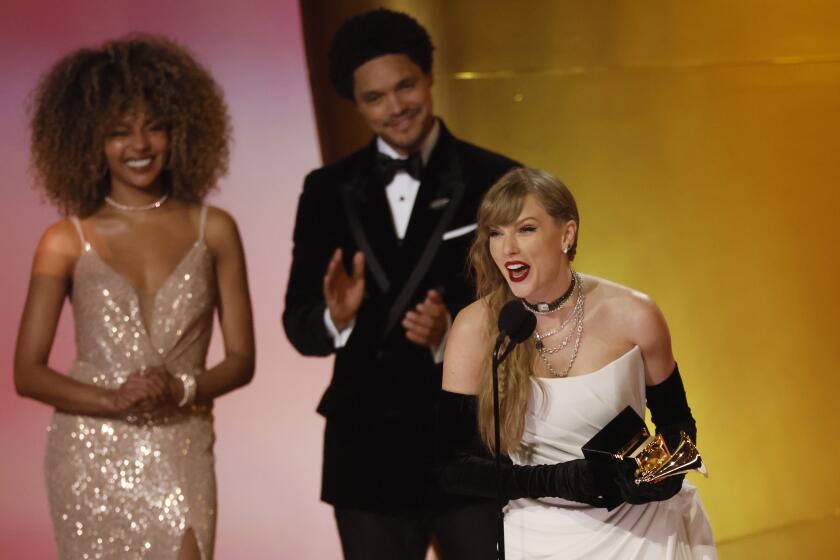Many With Stars in Their Eyes Compete for Coveted Spots as Universal Studios Tour Guides : Hollywood’s First Stop
- Share via
For two weeks, Mindy Steinman crammed like she never did in college.
Who appeared in the original “King Kong?” (Fay Wray)
When did Universal release “Earthquake?” (1974)
Who resided at 1313 Mockingbird Lane? (The Munsters)
“It’s kind of bizarre,” said Steinman after completing her final exams last week. “We put ourselves through this for only $5.75 an hour.”
Bizarre? Maybe. Logical? Absolutely. Steinman is an actress trying to make it in L.A., which means she will do things for little pay and the chance of a big payoff.
The job is tour guide at Universal Studios, or, for many tourists, their first contact with Hollywood. Michael Ovitz did it, and so did director John Badham (“WarGames,” “Short Circuit.”) and actor/singer Jack Wagner (“General Hospital,” “Santa Barbara”). And, in early March, 160 more candidates--mostly in their early- to mid-20s--applied, hoping to duplicate the success of Universal’s distinguished alums. The studio hires 85 new guides a year.
“We know it’s going to take awhile to put things together,” said Chris Barnes, 25, a former radio and television broadcaster for the Air Force who is pursuing acting. “This is just one small building block.”
The fantasy is that one afternoon while explaining the story of Norman Bates and his mother, the guide will stumble upon somebody named Spielberg. (Steven Spielberg, like many directors, producers and actors, has an office on the lot--Amblin Entertainment.)
Their eyes will meet and, presto, we will have the next Tom Cruise or Julia Roberts. It happens on a smaller scale. Recently, a guide landed a part in a national convenience store commercial.
Over the years, others have established key industry contacts through the tour. One of the fringe benefits of the job is frequent group seminars about the business arranged by the studio with actors and directors. That’s more than a lot of people get in this town.
The reality isn’t always that magical. Peter Lurie, 30, has worked as a guide for eight years. Lurie secured voice-over work through someone he met giving the tour, but he still needs his day job.
“I treat every tram tour as a performance,” Lurie said. “Otherwise, you’d go crazy.”
The first audition resembled an opening call for a new play or movie. The turnout of 160 was huge, an estimated 40% more than last year. Mike Sington, who supervises the guide training program, and his assistant, Julie Harders Mazer, thought the recession was responsible for the higher numbers.
Everyone brought a picture and resume. Sington and Mazer interviewed the applicants.
“Usually, if they’re wonderful, you know in an instant,” Sington said. Strong voice, constant eye contact and natural enthusiasm make an immediate good impression.
Same rule applies if someone bombs. One 30-year-old applicant from Sherman Oaks was disheveled and rude. He was a former meter reader for the gas company and was looking to switch careers.
“Would you want that guy showing Universal to people from Iowa?” Sington asked. Unkempt appearance or abrasiveness will eliminate candidates in a hurry.
Practically anybody capable of uttering coherent sentences and showing the slightest hint of a personality moved on to the next round. Of the original 160, half advanced. The applicants were competing for slots during the busy Easter period. They would work part time through Memorial Day, and full time through Labor Day. Pay starts at $5.75 an hour and is raised to $6.12 after 700 hours of work.
The assignment for the second round was to play Gene Siskel. Applicants were asked to defend their favorite movie. The most popular choices included “Cape Fear,” “It’s a Wonderful Life” and “Citizen Kane.” Some were asked to name someone they admired in the movie business. The point of the exercise was to show enthusiasm, charisma and vocal quality. Universal does not want someone who has trouble with diction.
“You hear the lisp?” Sington said of one candidate. “And what’s slight here would be amplified on the microphone.”
Universal also does not want someone with too much cynicism. The studio guide practices another form of public relations.
“They don’t like sarcasm here,” Mazer said.
That didn’t appeal to Oscar Johnson, 31, an actor who couldn’t quite carry off the role of Universal cheerleader. Johnson made it to the final stage of the application process before he quit.
“Everything was ‘Let’s pump up the glorious organ that is Universal.’ I couldn’t do that,” Johnson said. “They wanted me to push ‘Murder, She Wrote,’ like it was the second coming of Jesus, but I hate that show.”
Another prerequisite is the ability to follow directions. Some applicants missed that point when they rambled on about themselves, neglecting to talk about the movie. The studio can’t risk someone who doesn’t stick to the program.
“Producers will send us exactly what they want said about their upcoming productions,” Mazer said. She told of one misguided guide who recently described Universal’s new G-rated release, “Beethoven,” as “a dog who terrorizes a Pasadena couple.” “That dog is not Cujo,” she said. The guide was told to be more exact.
Sington and Mazer also viewed the movie review as a barometer of the applicant’s show business awareness. Much of the tour requires doling out tidbits of information about Hollywood and the ability to answer trivia questions from tourists. About a dozen candidates failed this part. A few couldn’t even name the five films nominated for this year’s Academy Awards.
“The guides who find the latest information are the best,” Mazer said. “It shows they just won’t be robots who stick with the same material.” One candidate named “Boyz N the Hood,” and spoke as if she made the film.
Altogether, 33 survived the movie review. Some who didn’t make it took the news like veterans of rejection.
“It was a positive experience,” said a 27-year-old actress who didn’t want her name linked to failure. “It keeps you in shape. I have an audition this afternoon, and I’m reading for a movie with a producer tomorrow.”
For the next stage, candidates were interviewed again by Sington and Mazer, and asked to read promotional material about the studio. Ten more were eliminated because of poor diction, low energy or stale personality. One applicant was dismissed for putting too much Shakespeare into his reading.
In all, 23 were paid $5 an hour to take an intense nine-day training class that included a written exam about Universal’s history and regular performances on the tram. They were just one step away from being officially hired.
Guides must be able to transmit knowledge of the old sets on the lot, from the streets of New York and Chicago to Old Mexico and Europe. The five-mile tour normally takes about 45 minutes, and guides take an average of four a day.
They also are taught what to do in case of a star sighting. First, make eye contact to make sure the star has time to greet America. Next, introduce the celebrity and elaborate on the newest project he or she is working on. Many stars are seen walking from their offices to sound stages for filming. Many, such as Spielberg and Angela Lansbury, take time to say a few words to the tourists.
“You must do whatever a star wants you to do,” Sington advised. “They rule the studio. They are making millions of dollars for us.”
The applicants become experts in a hurry.
“I have no idea of who dropped out of the presidential race,” Steinman said, “but I can tell you what year ‘Earthquake’ was released.”
Tia Yousse, who arrived in Los Angeles from Boston two months ago with $3,000 and a dream, was told she talked about John Wayne and “McHale’s Navy” in her sleep.
But the early tram performances were not impressive.
One finalist called actor Roy Scheider (“Jaws,” “52-Pickup”) Ray. Another referred to the “Airport” movies as the “Airplane” series.
For their final tram presentation, 17 applicants remained; four others dropped out because of acting roles or other commitments and two transferred to a later class.
The final tram performances dramatically improved. Candidates demonstrated thorough knowledge of the studio and spoke with clarity. Four, however, were too tentative and didn’t make the final cut. Each planned to try again.
Of the original 180 applicants, 13 officially started work last weekend.
In an industry where the odds are always formidable, any accomplishment is worth noting. Most of the guides hired are new arrivals in Los Angeles, and this is their first taste of success.
Said one new guide: “Now we have a place to go every day.”
More to Read
The biggest entertainment stories
Get our big stories about Hollywood, film, television, music, arts, culture and more right in your inbox as soon as they publish.
You may occasionally receive promotional content from the Los Angeles Times.










